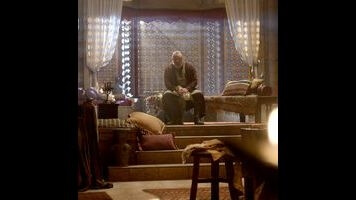At least God has smiled upon the show’s production values: The House Of Saul is immaculately constructed and alluringly lit—though its walls could stand to be a little thicker, as they don’t prevent assassination attempts, clandestine trysts, and other grist for the plot mill from being overheard. Beyond the palace walls, marketplaces hum with activity and David tends to his flock within vast, rolling pastures. The show is no slouch in the combat department, but its most impressive filmmaking favors sequences like the tragic turning point of the pilot, which juxtaposes a pre-wedding ritual and a brutal betrayal, the former bathed in soothing yellows while shadow, stone, and steel underline the latter’s cold-bloodedness.
In that moment, Of Kings And Prophets conjures intimacy and emotion it’s sorely lacking elsewhere—particularly when its characters are having moments of emotional intimacy and/or intimate emotions. Through three episodes, the show’s scale is paradoxically too large to make the personal beats stick, yet too constricted to do any satisfactory world-building. In swiftly sowing the seeds of Saul’s fall while plotting a meteoric rise for David, Of Kings And Prophets demonstrates the accelerated metabolism of a contemporary ABC drama, at the expense of the relationships between its characters or any sense of chronology. There’d be no telling that the Israelites have been at an impasse with the Philistines for 40 days if Ish-bosheth (James Floyd) didn’t put a number to it while discussing strategy with his brother Jonathan (Haaz Sleiman) in episode three, and you’d be forgiven for letting this exchange serve as a reminder that Floyd and Sleiman are playing brothers. Like Queen Ahinoam (Simone Kessell, going full Cersei) and their sister Merav (Jeanine Mason), Ish-bosheth and Jonathan are empty vessels of intrigue, their whispered dealings feeding stories up the food chain to David, Saul, and Samuel.
Of Kings And Prophets is bigger than just his character, but Rix provides something of a center for the show, and the chemistry he strikes up with Maisie Richardson-Sellers (as Saul’s daughter Michal) makes it seem as though there are some recognizable humans mixed in among the kings and prophets. The occasional flash of Rix’s telegenic pearly whites presents the show’s greatest challenge to the suspension of disbelief (apparently dentistry is very advanced in this vision of ancient Israel), but he never strains credulity as much as the broadest, biggest, loudest moments from Winstone’s Saul. The actor finds some stirring stuff in times of quiet contemplation for Saul, but he’s more frequently tasked with barking out royal decrees or pleading with the God that’s seemingly forsaken him. Even when Samuel is seized by the divine, Bakri manages to turn in a more reserved performance than Winstone. He’s a hammy king, but Of Kings And Prophets would be a lot more fun if it was on his wavelength, rather than spending most of its time pretending to the prestige-TV throne.
With its many moving parts never quite working in unison, Of Kings And Prophets plays the game of thrones and neither wins nor dies. And with fate set against it—production delays, a death trap of a time slot, and the favor of a network regime that was just deposed—it is instead cursed to roam the midseason desert, telling a story that’s unlikely to reach its final destination. (Though the thing moves so quickly, it might not need a full season to do so.) Of course, it’s not like anyone has to wait around for George R.R. Martin to learn how this one ends.

 Keep scrolling for more great stories.
Keep scrolling for more great stories.
